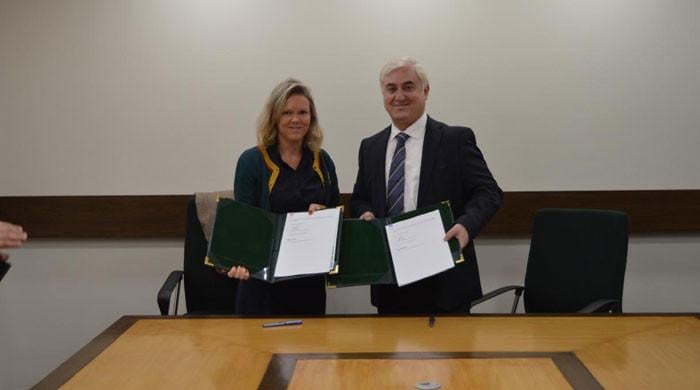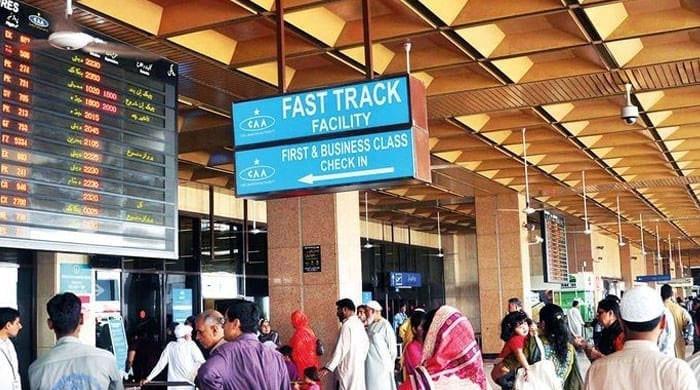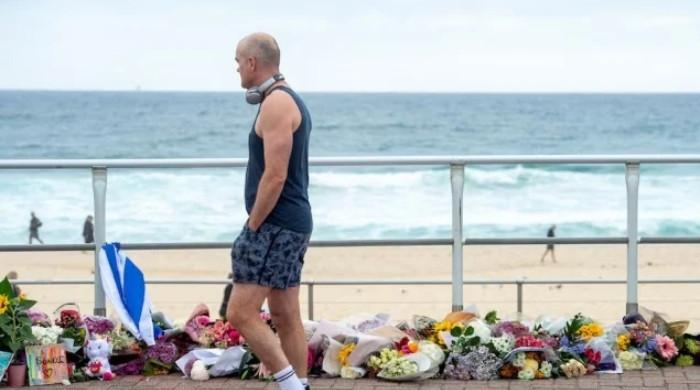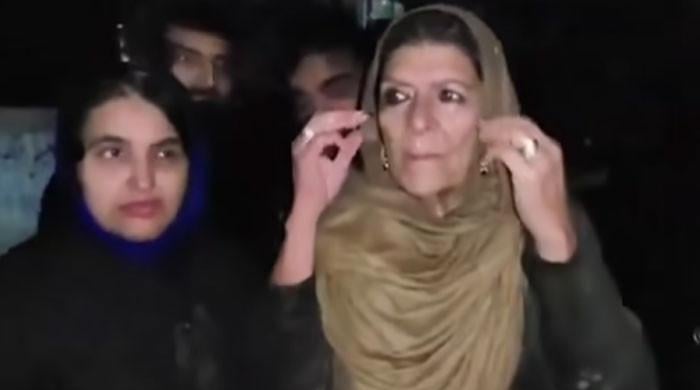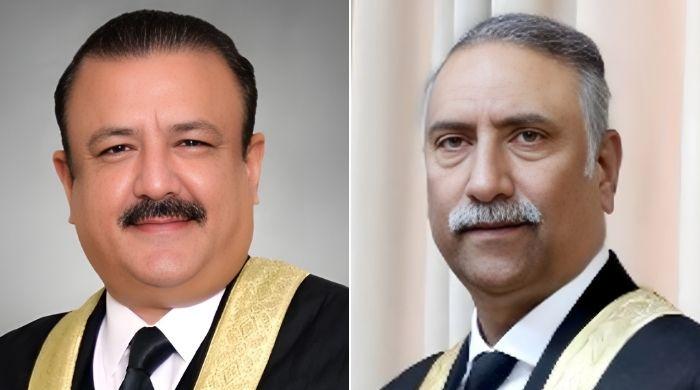Two-week lockdown in Karachi's coronavirus 'hotspots' begins
Move comes in light of report from deputy commissioner Karachi; lockdown to last till July 2
June 18, 2020
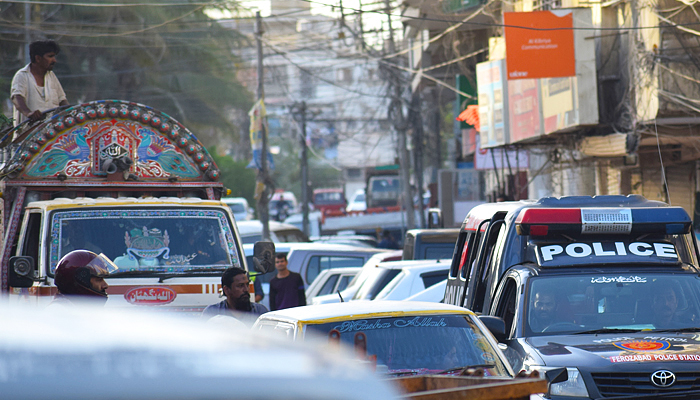
KARACHI: A two-week lockdown in the city's coronavirus hotspots began at 7pm on Thursday and will last till July 2.
According to Commissioner Karachi Iftikhar Ali Shallwani, a decision had been made to lock down the metropolis' sensitive areas in light of a report from the city's deputy commissioner that determined the coronavirus hotspots.
Shallwani has issued a notification with details of the areas to be locked down to curb the spread of the deadly coronavirus. Any movement in the restricted hotspot areas would be banned during the lockdown, said the notice.
A day prior, the deputy commissioners of three of Karachi's districts had identified the hotspots.
All 43 union councils (UCs) in the West, East, and Korangi districts were recommended to be locked down.
More than 157,000 infections and 3,000 deaths have been reported due to the coronavirus all over Pakistan, with close to 60,000 cases in both Sindh and Punjab.
Read more: 'Smart lockdown’ imposed in major cities of Pakistan as cases surge past 148,000
Emerging coronavirus hotspots
1. District Korangi
- Korangi Town: UC-2 Makhdoom Bilawal, Qayyomabad-A & B Area, Allahwala Town, Nasir Colony, P&T Colony, Darrusalam
- Malir Town: UC-1 Moinaabad Phase 3, SI, 35/3 Model Colony, Jaffar Bagh and Nashtar Square
- Landhi Town: UC-9 36-B Area near to Street Rehmania Nlasjid, Awami Colony, Imambargh Wali Asar Area and Power House Area
- Shah Faisal Town: UC-7 Millat Town, Al-Falah Society and Malir Halt and UC-9 CAA Colony, Cantt. Bazar and Old Iqbalabad
2. District South
- UC Karachi Cantonment: Barzata Line and Doli Khata
- UC Kharadar-3: Lee Market
- UC Saddar-8: Burns Road, M.A. Jinnah Road, Main Saddar and Urdu Bazaar
- UC Phase VI: Khayaban-e-Badar and Khayaban-e-Muhafiz
- UC Lyari: Agra Taj-2 and Behar Colony
3. District East
- Gulshan Town: UC-1 Muhammad All Society, UC-2 Bahadurabad and Block 14, UC-4 Essa Nagri, UC-6 Block 13 (A&C), UC-7 Gulshan-e-Jamal, UC-8 13-D/II, UC-9 Block 7, UC-10 Block 14, 15, 11, Gulistan-e-Johar Block 2, UC-12 Sachal Goth and Rabia Petal, UC-13 Safoora, UC-14 Rufi Lake Drive Inn and Gulistan-e-Johar Block 13
- Jamshed Town: UC-6 PECHS Block 2 Tariq Road and Block 6, UC-7 PECHS Block II and Block 6, UC-8 Balti Mohalla, UC-10 Martin Quarters and Fatima Jinnah Colony, UC-11 Jamat Khana, Jahangir Road Quarters No. 02, Jahangir Road No. 01, Teen Hatti and Bijli Ground, UC-12 Soilder Bazar Numaish Area
4. District West
- UC-5 (Songal): Gulshan-e-Maymar and Khuda Ki Basti Phase 2
- UC-3 (Islam Nagar): Naval Colony, Sector 4
- UC-5 (Saeedabad): Area 5G, 5J, A3
- UC-4 (Metroville): Block 3
- UC-6 (Frontier Colony): Sector 4 & 5 near Malakand Hospital, Ismaili Quarters
- UC-6 (Ghaziabad): Christian Colony
5. District Malir
- UC-3 (Cattle Colony): Road No. 09, Complete Commercial Market area)
- Gulshan-e-Hadeed-6: Complete Commercial Markets of Phase-I & Phase-II
- UC-5 (Jaffer e Tayyar): Jinnah Square Commercial Market
- UC-1 (Muzafarabad): D Area (Main Commercial Market Road from 50 Bedded Hospital to 52 Wing Pakistan Rangers), Old Area (Main Commercial Market Road), Jacob Line (Main Commercial Market Road), Majeed Colony Sector I & II (Main Commercial Markets and Muzafarabad Rerhi Road (Main Commercial Markets from Hospital Chowrangi to Hussain Chowrangi)
- UC-3 (Dawood Chowrangi): Main Commercial Markets from Dawood Chowrangi towards 89 Petrol Pump
- UC-4 (Quaidabad): Main Quaidabad, Gosht Gali, Murghi Khana Main Commercial Market, Majeed Panwala area near Mobile Market and All Mobile Markets
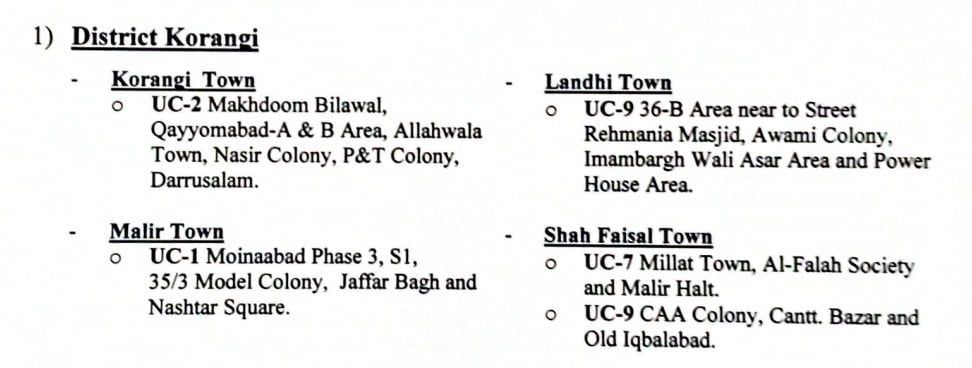
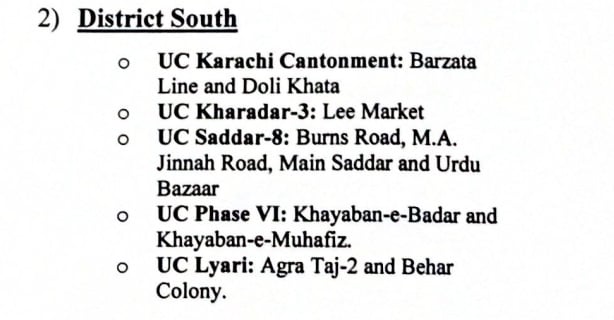
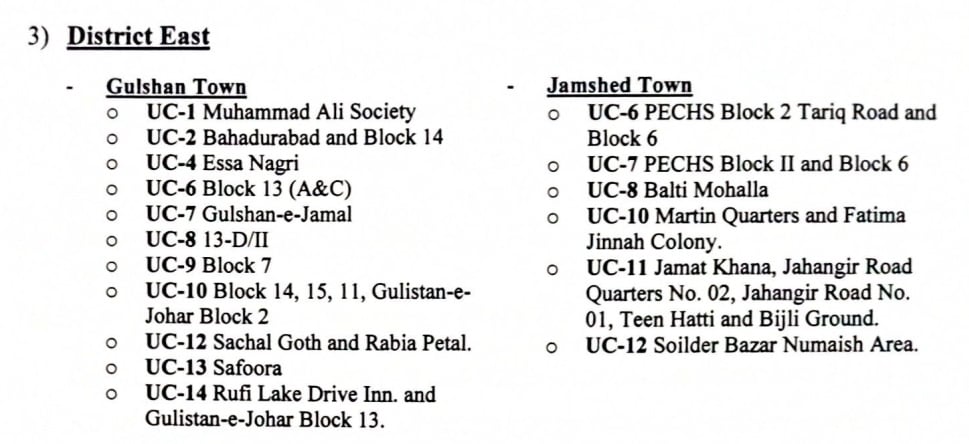
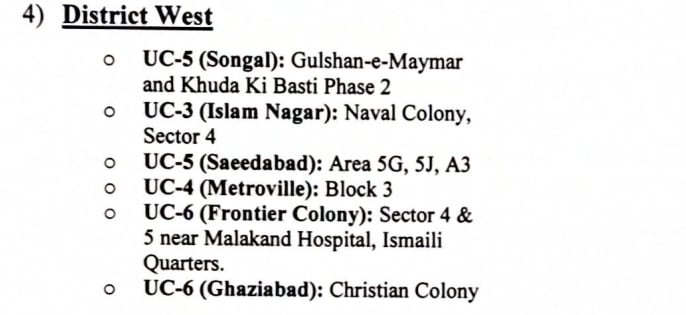
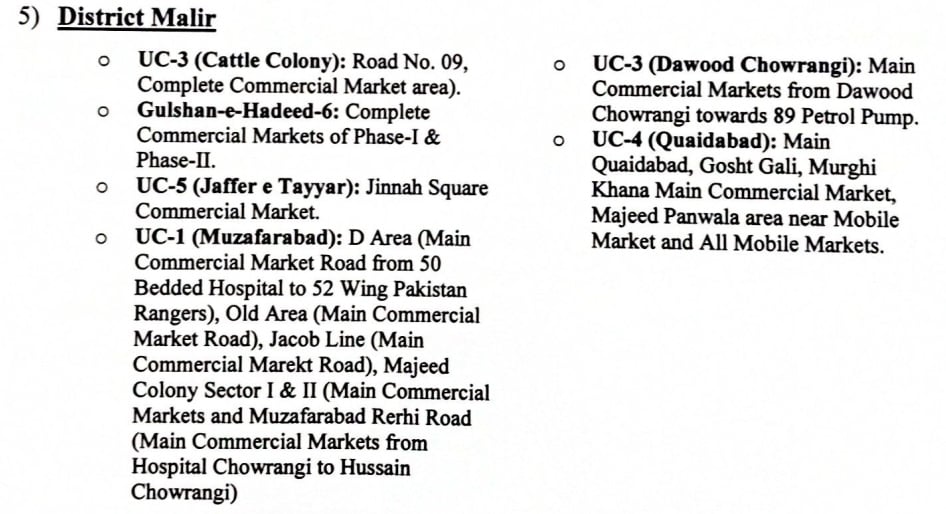
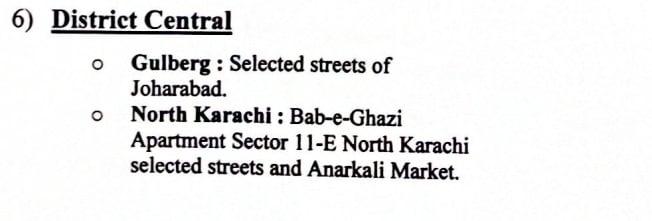
SOPs for areas under lockdown
i) Anyone entering or exiting the lockdown area shall wear a mask without any exception
ii) Movement of people residing in areas under lockdown shall be strictly restricted
iii) Only grocery shops/convenience stores and pharmacies shall be allowed to remain open in these areas during specific timings as specified in the Home Department's order dated June 01, 2020
iv) All other business activities shall strictly remain closed without any exceptions
v) All kinds of industrial units falling in these areas shall remain closed
vi) No home delivery/take away of any sort will be allowed from restaurants/ fast food joints
vii) Only one person of household shall be allowed outside for buying food items and medicines by displaying original CNIC to the law enforcement agencies
viii) Only one attendant, where extremely necessary, shall be allowed with a person in need of medical care
ix) No private/family get-together will be allowed in private homes
x) No joy riding shall be allowed. Residents coming out of their houses should have a valid reason to do so
xi) Pillion riding shall be strictly banned in these areas
xii) All public transport (buses, taxis, rickshaws, Uber, Careem, Swvl, Airlift) is banned to ply on the roads in these areas
xiii) Government will make every effort to provide ration to the needy people residing in these areas through philanthropic organizations and by employing its own resources
xiv) Government will make every effort to provide mobile dispensaries and mobile utility stores in these areas
xv) The lockdown shall be operational from 7pm on June 18, 2020. It will remain effective till July 7, 2020
'Smart lockdown'
Earlier this week, the National Command and Operation Centre (NCOC) had issued a list of 20 cities identified as coronavirus hotspots across Pakistan and, a day later, certain areas of the major cities were under a "smart lockdown".
“A total of 20 cities across Pakistan have been identified as having likely increase in ratio/speed of infection which needs restrictive measures for containment,” a statement by the NCOC issued Monday read.
In Sindh’s Ghotki, four areas have been sealed and section 188 imposed after it was identified as one of the areas.
The other cities identified by the NCOC were Karachi, Lahore, Quetta, Peshawar, Rawalpindi, Islamabad, Faisalabad, Multan, Gujranwala, Swat, Hyderabad, Sukkar, Sialkot, Gujarat, Ghotki, Larkana, Khairpur, DG Khan, Malakand, and Mardan.
The NCOC noted that the test, trace and quarantine (TTQ) strategy was aimed at identifying disease spread, focused clusters/hotspots to enable targeted lockdowns and need-driven resource optimisation at all levels.
A few day ago, National Information Technology Board (NITB) Chief Executive Shabahat Ali Shah had shared a geographical snapshot of the city's coronavirus hotspots.
"Please stay indoors," Shah had urged.




